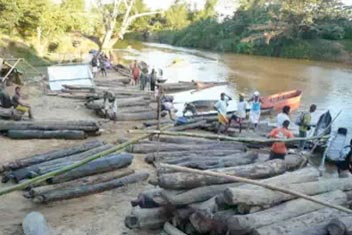Background on why the US Fish & Wildlife Service raided Gibson Guitars.
|
The following is a statement from the Environmental Investigation Agency, a nonprofit that has worked closely on the Lacey Act, timber legality, and the illegal rosewood trade in Madagascar. Any views expressed here do not necessarily reflect the views of mongabay.com. |
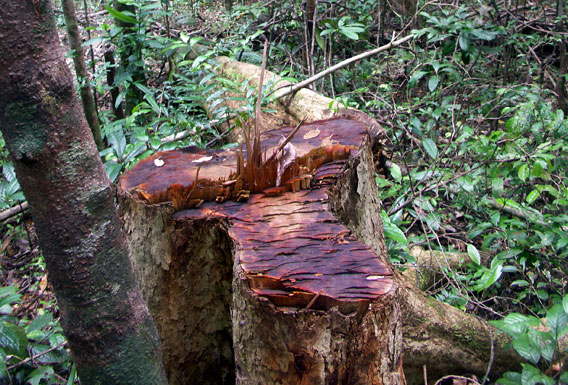
Rosewood logging in Masoala National Park, a UNESCO World Heritage Site. Photo by Rhett A. Butler
On 24 August 2011, agents of the Fish & Wildlife Service (FWS) raided Gibson Guitar facilities in Nashville and Memphis, Tennessee, seizing ebony and rosewood material, guitars and guitar parts as evidence of suspected violation(s) of the U.S. Lacey Act. The Lacey Act is a long-standing anti-trafficking statute which prohibits commerce of illegally-sourced wildlife, plants and wood products from either the U.S. or other countries.
The government has not yet released a statement to the public on the case, but the affidavit filed to obtain the search warrants has been unsealed and is circulating (ref: “Affidavit in Support of Search Warrant #11-MJ-1067 A,B,C,D”). The facts referred to below are based on information contained in this affidavit. The Environmental Investigation Agency urges the FWS to issue further statements in order to help calm the confusion and concern generated among many companies and individuals in the musical instruments industry, other businesses and the media.
The Lacey Act violation in question concerns Gibson’s import of pieces of rosewood and ebony that the government alleges to have been falsely declared both during export from India and during import to the U.S. The sawnwood in question had been exported from India under an incorrect tariff code (HS 9209), allegedly to avoid the Indian government’s prohibition on export of sawnwood products (HS 4407); and had been declared upon import as veneer (HS 4408). The affidavit states that this description “fraudulently presents as a shipment that would be legal to export from India, and, in turn, would not be a violation of the Lacey Act.” According to the affidavit, discrepancies among the paperwork accompanying the shipment suggest that the recipients knew they were purchasing sawnwood.
Contrary to claims by some pundits, rosewood in Madagascar is not used for wood-fuel or charcoal. It is widely recognized as a valuable hardwood and its harvest is widely known to be illegal. 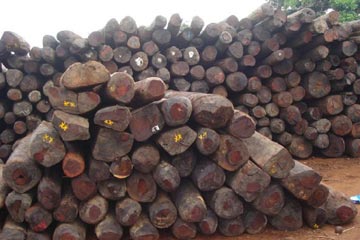 Rosewood logs.
|
The affidavit describes eleven shipments of Indian ebony and rosewood imported in this manner over the past two years, despite what appears to be a publicly available Indian law prohibiting it. The facts in the affidavit appear to have been sufficient for a judge to approve search warrants on probable cause.
EIA trusts that the current case will receive due process through the U.S. justice system. It is important to be clear, in general terms, that the Lacey Act is a U.S. law that reinforces and supports the laws of other countries concerning the sourcing, harvest and trade of wildlife, plants and wood products. It is common for countries to have bans and restrictions on export of logs or sawnwood; these laws are directly linked to forest management and protection efforts. They are often an important tool to help control export flows of illegally logged timber, and to ensure that the benefits of value-added processing contribute to development within these often poor countries.
The Lacey Act’s intent is to support the rule of law through mutual respect, and to ensure that American businesses and consumers are not contributing to illegal activity or environmental harm in our own country or overseas. The law also helps ensure that U.S. producers are operating on a level playing field and not being undersold by illegal supply, which has been estimated to cost U.S. industry $1 billion annually. Like many new procedures, these measures may create confusion and even fear in the short term, as companies adapt their practices and mindset. However, media messages that promote this fear do businesses and people a disservice. There is no indication that the government has interest in professional or amateur musicians, whether or not their instruments contain Indian or Malagasy precious woods. The FWS has always stated its intent to investigate and shut down networks of illegal smuggling and trade, not individuals. Laws like Lacey are necessary security measures for the protection of the world’ forests, and this adjustment process is part of creating a “new normal” that will prevent the trees so important to musical instrument makers and other wood industries from disappearing. Ebony and rosewood species, for example, are overharvested and threatened throughout most of their global range. However, it is possible to source them legally. No music maker wants his or her instruments to be produced in a manner that is bad for forests, wildlife or people, or that may well preclude future generations from enjoying the same joy and quality.
Why was Gibson raided in 2009?
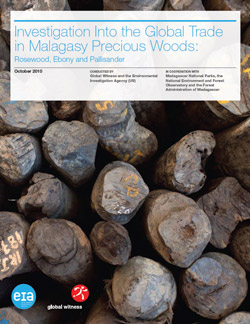 Investigation Into the Global Trade in Malagasy Precious Woods: Rosewood, Ebony and Pallisander |
Madagascar’s national parks, full of wildlife and trees found nowhere else on earth, have been invaded over the past few years by illegal loggers seeking rosewood and ebony. A network of corrupt timber barons controls this trade in Madagascar; the wood is sold onwards to Europe, China and the United States. A researcher at the Missouri Botanical Gardens described Madagascar precious woods to the Wall Street Journal as “the equivalent of Africa’s blood diamonds.” Gibson was raided in 2009 in connection with its import of ebony from Madagascar, in violation of bans on this species’ export.
The case is currently in civil proceedings and the Department of Justice has stated publicly that it expects to file criminal charges, although no charges have been filed yet. Information released in affidavits and motions over the past year include excerpts from internal emails indicating that Gibson decided to buy illegal wood knowing the risks involved.
In the current civil case, in the District Court of Tennessee, Gibson asserts that the wood seized in 2009 was legally exported under Madagascar law and no law has been violated. The government asserts that the seized Madagascar ebony wood is property illegal to possess, “both because it was unfinished wood and because Claimants’ source for ebony in Madagascar was not authorized to sell it.”
The June 4th filing in the current civil case, states that:
-
“Gibson sourced its unfinished ebony wood in the form of blanks (for use in the manufacture of fingerboards for Gibson guitars) from Nagel (in Germany), which obtained it exclusively from Roger Thunam (a supplier in Madagascar). Madagascar prohibits the harvest of ebony wood as well as the exportation of unfinished ebony wood.”
The filing also refers to internal Gibson emails: “[A] Gibson employee…wrote that ‘[t]he true Ebony species preferred by Gibson Musical Instruments is found only in Madagascar (Diospyros perrieri). This is a slow-growing tree species with very little conservation protection and supplies are considered to be highly threatened in its native environment due to over exploitation.’ In fact, [he] ‘spent two and a half weeks in Madagascar this June [2008],’ writing on his return, ‘I represented our company along with two other guitar manufacturers…. All legal timber and wood exports are prohibited because of wide spread corruption and theft of valuable woods like rosewood and ebony.’”
“On February 25, 2009, in a reference to the potential long term solution, [he] wrote…that the company Maderas Barber ‘has been in the business a long time and may be able to help begin some legitimate harvests. Mr. [Roger] Thunam on the other hand should now be able to supply Nagel with all the rosewood and ebony for the grey market.’” (Emphasis added.)
The procedures of the U.S. judicial system give defendants and the government both ample opportunities to make their arguments and ensure all information is brought to light. New developments in this case are expected soon.
Related articles
Environmental groups deny ‘conspiracy’ claims by Madagascar’s acting leader
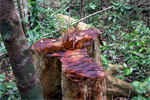
(02/03/2011) Two environmental groups investigating the illegal rosewood trade flatly rejected claims by Madagascar’s acting president that they are involved in a campaign to undermine his rule. Andry Rajoelina, the former mayor of the capital city of Antananarivo who assumed power following civil strife in March 2009, claimed last month in an interview with Revue de l’océan Indien that the London-based Global Witness and the Washington D.C.-based Environmental Investigation Agency were attempting to sully his image through their undercover investigation into the rosewood trade. The groups found evidence suggesting that Rajoelina was involved in rosewood trafficking. The evidence included video footage of Chinese rosewood traders claiming to deal directly with Rajoelina.
The illegal logging cycle in Madagascar
(06/23/2010) The latest issue of the journal Madagascar Conservation & Development provides a comprehensive look into Madagascar’s illegal logging trade, which has generated more than $200 million for a small group of individuals over the past year. The trade, which spikes just prior to national elections and may be a source of funds for ruling politicians, has taken a heavy toll on the lowland rainforests of Madagascar, with targeted species now at risk of extinction.
Rainforest slaughter continues in Madagascar despite “ban” on timber exports

(06/21/2010) New eyewitness reports indicate continued logging of Madagascar’s Masoala National Park for rosewood despite a government “moratorium” on logging and timber exports. A source near Marofinaritra, a town between Masoala and Antalaha, reports heavy night-time movement of trucks carrying illegally logged timber from the park. The wood is believed to be destined for Antalaha, a regional hub for the rosewood trade.
How to end Madagascar’s logging crisis

(02/10/2010) In the aftermath of a military coup last March, Madagascar’s rainforests have been pillaged for precious hardwoods, including rosewood and ebonies. Tens of thousands of hectares have been affected, including some of the island’s most biologically-diverse national parks: Marojejy, Masoala, and Makira. Illegal logging has also spurred the rise of a commercial bushmeat trade. Hunters are now slaughtering rare and gentle lemurs for restaurants.
Satellites being used to track illegal logging, rosewood trafficking in Madagascar

(01/28/2010) Analysts in Europe and the United States are using high resolution satellite imagery to identify and track shipments of timber illegally logged from rainforest parks in Madagascar. The images could be used to help prosecute traders involved in trafficking and put pressure on companies using rosewood from Madagascar.
Coup leaders sell out Madagascar’s forests, people

(01/27/2010) Madagascar is renowned for its biological richness. Located off the eastern coast of southern Africa and slightly larger than California, the island has an eclectic collection of plants and animals, more than 80 percent of which are found nowhere else in the world. But Madagascar’s biological bounty has been under siege for nearly a year in the aftermath of a political crisis which saw its president chased into exile at gunpoint; a collapse in its civil service, including its park management system; and evaporation of donor funds which provide half the government’s annual budget. In the absence of governance, organized gangs ransacked the island’s biological treasures, including precious hardwoods and endangered lemurs from protected rainforests, and frightened away tourists, who provide a critical economic incentive for conservation. Now, as the coup leaders take an increasingly active role in the plunder as a means to finance an upcoming election they hope will legitimize their power grab, the question becomes whether Madagascar’s once highly regarded conservation system can be restored and maintained.
(11/19/2009) Federal agents from the U.S. Fish and Wildlife Service raided Gibson Guitar’s factory Tuesday afternoon, due to concerns that the company had been using illegally harvested wood from Madagascar, reports the Nashville Post.
Lessons from the crisis in Madagascar, an interview with Erik Patel

(08/11/2009) On March 17th of this year the President of Madagascar, Marc Ravalomanana, resigned his post. This made way for Andry Rajoelina, mayor of Madagascar’s capital, to install himself as president with help from the military. The unrest and confusion that usually accompanies such a coup brought disaster on many of Madagascar’s biological treasures. Within days of Ravalomanana’s resignation, armed gangs, allegedly funded by Chinese traders, entered two of Madagascar’s world-renowned national parks, Marojejy and Masoala parks, and began to log rosewood, ebonies, and other valuable hardwoods. The pillaging lasted months but the situation began to calm down over the summer. Now that the crisis in Madagascar has abated—at least for the time being—it’s time to take stock. In order to do so, Mongabay spoke to Erik Patel, an expert on the Critically Endangered Silky Sifaka and frequent visitor to Madagascar, to find out what the damage looks like firsthand and to see what lessons might be learned.
Rainforest pillage continues in Madagascar
(04/16/2009) Gangs of illegal rosewood loggers continue to pillage the wildlife-rich forests of northeastern Madagascar, reports a local source.
Conservation groups condemn ‘open and organized plundering’ of Madagascar’s natural resources

(03/30/2009) Eleven conservation organizations—including WWF, CI, and WCS—have banded together to condemn logging in Madagascar’s world renowned parks during a time of political crisis. Taking advantage of the turmoil after interim president Andry Rajoelina took control of the country in a bloodless coup from former president Marc Ravalomanana on March 17th, pristine forests have been plundered for valuable wood, wildlife trafficking has increased, and illegal mining operations have begun say the conservation organizations.
Scramble to log Madagascar’s valuable rainforest trees in midst of crisis
(03/23/2009) Armed gangs are logging rosewood and other valuable hardwoods from Marojejy and Masoala parks in Madagascar following abandonment of posts by rangers in the midst of the island nation’s political crisis, reports marojejy.com and local sources.
Political turmoil in Madagascar threatens lemurs, parks

(03/19/2009) Political turmoil in Madagascar has wrecked the country’s emerging ecotourism industry and is now threatening to undo decades of conservation work. Conservation in Madagascar is highly dependent on income from tourism. Half of park entrance fees are returned to communities living in and around protected areas. Without this source of income, locals in some areas may turn to conservation areas for timber, fuelwood, agricultural land, and wildlife as food and for export.
